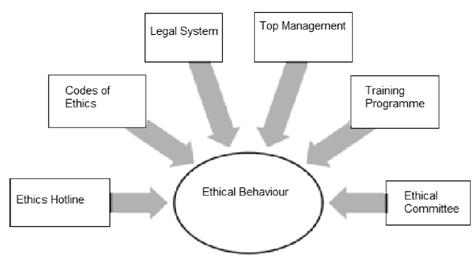Duplicating software for friends, co-workers or even for business has become a widespread practice. All software programs are protected by copyright laws and duplicating them is an offense. How, then, has making illegal copies become such a common and accepted practice in people’s homes and places of work? Part of the answer revolves around the issue that software isn’t like some other intellectual property. Intellectual property is that which is developed by someone and is attributable directly to the thinking process. Software is different from a book in that anyone can easily copy it-and an exact replication is achievable. Another reason is related to cultural differences. People don’t see copy as stealing. People don’t find anything wrong in making a video copy of a hit feature film and selling it or hiring out. People defend their behavior by saying: ‘Everybody does it! I won’t get caught! Or no one reallyContinue reading
Business Ethics
Business ethics (also known as corporate ethics) is a form of applied ethics or professional ethics that examines ethical principles and moral or ethical problems that arise in a business environment. It applies to all aspects of business conduct and is relevant to the conduct of individuals and business organizations as a whole. Business ethics can be both a normative and a descriptive discipline. As a corporate practice and a career specialization, the field is primarily normative. In academia descriptive approaches are also taken. The range and quantity of business ethical issues reflects the degree to which business is perceived to be at odds with non-economic social values.
Why Do Organizations Have a Code of Ethics?
Business ethics are the guidelines a company has in place to follow when interacting with internal and external sources, with the purpose being to impact the way in which they do business. It also means that all professionals will be held to the same standard, as it’s something the organisation’s core values and principles are based on. It is beneficial to ensure that everyone involved are treated with respect, and to create a working environment that’s as positive as possible. By having a code of ethics, a business is presenting themselves as having a unified attitude and would be seen as behaving with integrity. Businesses adopting a code of ethics will create a stronger environment of trust and integrity within the workplace. It is helpful when all employees, including management, are following the same rules and behaving in a certain way because it means most conflicts will be removed fromContinue reading
Managing Ethics in Business Organizations
Earlier, it’s believed that ethics is a prerogative of individuals, but now this perception has immensely changed. Many companies use management techniques to encourage ethical behavior at an organizational level. Business ethics (also corporate ethics) is a form of applied ethics or professional ethics that examines ethical principles and moral or ethical problems that arise in a business environment. It applies to all aspects of business conduct and is relevant to the conduct of individuals and entire organizations. Business ethics can be thought of as written and unwritten codes of principles and values that govern decisions and actions within a company. In the business world, the organization’s culture sets standards for determining the difference between good and bad decision-making and behavior. In the most basic terms, a definition for business ethics boils down to knowing the difference between right and wrong and choosing to do what is right. The phraseContinue reading
What is Marketing Ethics?
One of the most known definitions of ethics is the one from Aristotle: Human actions from the point of view in their rightness or wrongness. Ethics should concern “personal virtue” and with every decision, one should be honest, good and caring. A definition that is so idealistic and simplistic is not helpful in finding a solid definition: right and wrong are probably just as normative as the term ethics. When we try to give a definition of the term ethics it appears from the literature that you can look at it from two different philosophical views, also know as “ethical dualism”. The first view is the teleological view, also known as the consequentialist view or utilarism, which is based on the results of certain actions taken. Whereas the other view, deontology, is more based on average behavior and obligations to other people. Teleology is based on the ethical valuation ofContinue reading
Case Study: Reasons behind the Bankruptcy of Lehman Brothers
The bankruptcy of Lehman Brothers was a result of the investment bank’s exposure to the 2007-2010 financial crisis. In fact, the demise of the investment bank would come to symbolize the crisis. Therefore, in order to understand the bankruptcy of Lehman Brothers, a consummate understanding of the 2007-2010 financial crisis is requisite. As such, an examination of crisis will serve as introductory. Several factors contributed to the fall of Lehman Brothers. Perhaps most important, however, was the period of deregulation that preceded the crisis. Arguably, the period of deregulation started during the Reagan Era. Reaganomics, the lassiez faire economic policies advocated by the former president, may have served as the starting point for the deregulatory climate that ensued for the following two decades. Either way, the following two decades witnessed an overriding belief in the virtues of deregulation. In 1999, President Clinton signed the Gramm-Leach-Bliley Financial Services Modernization Act intoContinue reading
Blending Spiritual Values with Business
The root for value is valor, which means strength. Values are sources of strength because they give people the power to take action. Values are deep and emotional and often difficult to change. Values are the essence of any organization and philosophy for achieving success. Values provide employees with a sense of common direction and guidelines for day to day behavior. The first step in creating an atmosphere of common commitment is to invite the hearts and minds of employees to join the purpose of the organization. Shared missions, values and vision bring people together. They unite and provide the link between diverse people and activities. People who share values or vision are more likely to take responsibility; they are more likely to challenge the limits of convention. Values provide guidance. Spiritual value is a way of expressing more humanity and recognizes each persons own beliefs. Traditional ways of achievingContinue reading

